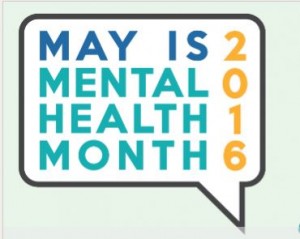 ALEXANDRIA, Va.—When mental illnesses or disorders are talked about, the language typically used to describe them tends to be clinical and impersonal. These words, while useful for doctors or clinicians, often don’t do justice to what life with a mental illness feels like. That is why this year’s theme for May is Mental Health Month—Life With a Mental Illness—is a call to action to share what life with a mental illness feels like to someone going through it.
ALEXANDRIA, Va.—When mental illnesses or disorders are talked about, the language typically used to describe them tends to be clinical and impersonal. These words, while useful for doctors or clinicians, often don’t do justice to what life with a mental illness feels like. That is why this year’s theme for May is Mental Health Month—Life With a Mental Illness—is a call to action to share what life with a mental illness feels like to someone going through it.
May is Mental Health Month was started 67 years ago by Mental Health America (MHA), to raise awareness about mental health conditions and the importance of good mental health for everyone. Last year, Mental Health Month materials were seen and used by 19 million people, with more than 5,500 entities downloading MHA’s tool kits. The 2015 theme—based off of our B4Stage4 initiative—helped individuals understand that when you address mental health symptoms before Stage 4, people can often recover quickly, and live full and productive lives.
This year, we are building off of the B4Stage4 message and encouraging individuals to give voice to what it really means to live at stages 1, 2, 3, and 4 of mental illness. Life with a Mental Illness is meant to help remove the shame and stigma of speaking out, so that more people can be comfortable coming out of the shadows and seeking the help they need.
“Mental illnesses are common and treatable, and help is available. We need to speak up early—before Stage 4—and in real, relatable terms so that people do not feel isolated and alone,” said Paul Gionfriddo, president and CEO, Mental Health America. “Sharing is the key to breaking down the stigma surrounding mental illnesses and to showing others that they are not alone in their feelings and their symptoms.”
This Mental Health Month, we are encouraging people to speak up about how it feels to live with a mental illness by tagging social media posts with #mentalillnessfeelslike. Posting with our hashtag is a way to speak up, to share your point of view with people who may be struggling to explain what they are going through—and help others figure out if they too are showing signs of a mental illness.
MHA has also developed a series of fact sheets available on our website (www.mentalhealthamerica.net/
“Prevention, early identification and intervention, and integrated services work,” concluded Gionfriddo. “Telling people how life with a mental illness feels helps build support from friends and family, reduces negative attitudes and misperceptions, and is crucial to recovery.”
For more information on May is Mental Health Month, visit MHA’s Web site at www.mentalhealthamerica.net/











